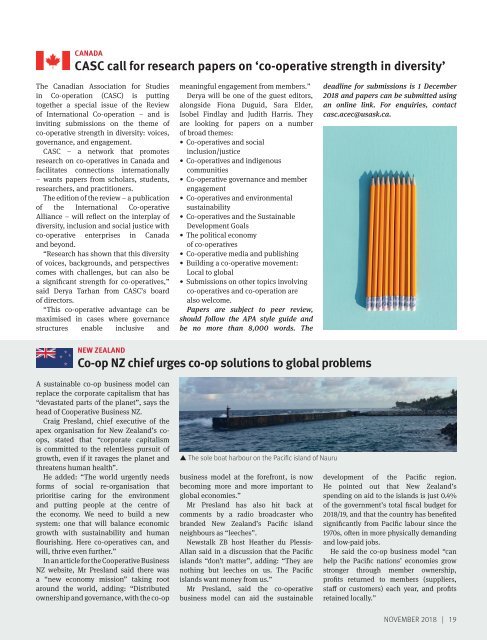NOVEMBER 2018
The November edition of Co-op News looks at co-operation as a remedy - and a safeguard. Plus... how we covered the first world war 100 years ago, reports from co-operative conferences around the world, and our 2018 Christmas gift guide.
The November edition of Co-op News looks at co-operation as a remedy - and a safeguard.
Plus... how we covered the first world war 100 years ago, reports from co-operative conferences around the world, and our 2018 Christmas gift guide.
Create successful ePaper yourself
Turn your PDF publications into a flip-book with our unique Google optimized e-Paper software.
CANADA<br />
CASC call for research papers on ‘co-operative strength in diversity’<br />
The Canadian Association for Studies<br />
in Co-operation (CASC) is putting<br />
together a special issue of the Review<br />
of International Co-operation – and is<br />
inviting submissions on the theme of<br />
co-operative strength in diversity: voices,<br />
governance, and engagement.<br />
CASC – a network that promotes<br />
research on co-operatives in Canada and<br />
facilitates connections internationally<br />
– wants papers from scholars, students,<br />
researchers, and practitioners.<br />
The edition of the review – a publication<br />
of the International Co-operative<br />
Alliance – will reflect on the interplay of<br />
diversity, inclusion and social justice with<br />
co-operative enterprises in Canada<br />
and beyond.<br />
“Research has shown that this diversity<br />
of voices, backgrounds, and perspectives<br />
comes with challenges, but can also be<br />
a significant strength for co-operatives,”<br />
said Derya Tarhan from CASC’s board<br />
of directors.<br />
“This co-operative advantage can be<br />
maximised in cases where governance<br />
structures enable inclusive and<br />
meaningful engagement from members.”<br />
Derya will be one of the guest editors,<br />
alongside Fiona Duguid, Sara Elder,<br />
Isobel Findlay and Judith Harris. They<br />
are looking for papers on a number<br />
of broad themes:<br />
• Co-operatives and social<br />
inclusion/justice<br />
• Co-operatives and indigenous<br />
communities<br />
• Co-operative governance and member<br />
engagement<br />
• Co-operatives and environmental<br />
sustainability<br />
• Co-operatives and the Sustainable<br />
Development Goals<br />
• The political economy<br />
of co-operatives<br />
• Co-operative media and publishing<br />
• Building a co-operative movement:<br />
Local to global<br />
• Submissions on other topics involving<br />
co-operatives and co-operation are<br />
also welcome.<br />
Papers are subject to peer review,<br />
should follow the APA style guide and<br />
be no more than 8,000 words. The<br />
deadline for submissions is 1 December<br />
<strong>2018</strong> and papers can be submitted using<br />
an online link. For enquiries, contact<br />
casc.acec@usask.ca.<br />
NEW ZEALAND<br />
Co-op NZ chief urges co-op solutions to global problems<br />
A sustainable co-op business model can<br />
replace the corporate capitalism that has<br />
“devastated parts of the planet”, says the<br />
head of Cooperative Business NZ.<br />
Craig Presland, chief executive of the<br />
apex organisation for New Zealand’s coops,<br />
stated that “corporate capitalism<br />
is committed to the relentless pursuit of<br />
growth, even if it ravages the planet and<br />
threatens human health”.<br />
He added: “The world urgently needs<br />
forms of social re-organisation that<br />
prioritise caring for the environment<br />
and putting people at the centre of<br />
the economy. We need to build a new<br />
system: one that will balance economic<br />
growth with sustainability and human<br />
flourishing. Here co-operatives can, and<br />
will, thrive even further.”<br />
In an article for the Cooperative Business<br />
NZ website, Mr Presland said there was<br />
a “new economy mission” taking root<br />
around the world, adding: “Distributed<br />
ownership and governance, with the co-op<br />
p The sole boat harbour on the Pacific island of Nauru<br />
business model at the forefront, is now<br />
becoming more and more important to<br />
global economies.”<br />
Mr Presland has also hit back at<br />
comments by a radio broadcaster who<br />
branded New Zealand’s Pacific island<br />
neighbours as “leeches”.<br />
Newstalk ZB host Heather du Plessis-<br />
Allan said in a discussion that the Pacific<br />
islands “don’t matter”, adding: “They are<br />
nothing but leeches on us. The Pacific<br />
islands want money from us.”<br />
Mr Presland, said the co-operative<br />
business model can aid the sustainable<br />
development of the Pacific region.<br />
He pointed out that New Zealand’s<br />
spending on aid to the islands is just 0.4%<br />
of the government’s total fiscal budget for<br />
<strong>2018</strong>/19, and that the country has benefited<br />
significantly from Pacific labour since the<br />
1970s, often in more physically demanding<br />
and low-paid jobs.<br />
He said the co-op business model “can<br />
help the Pacific nations’ economies grow<br />
stronger through member ownership,<br />
profits returned to members (suppliers,<br />
staff or customers) each year, and profits<br />
retained locally.”<br />
<strong>NOVEMBER</strong> <strong>2018</strong> | 19


















